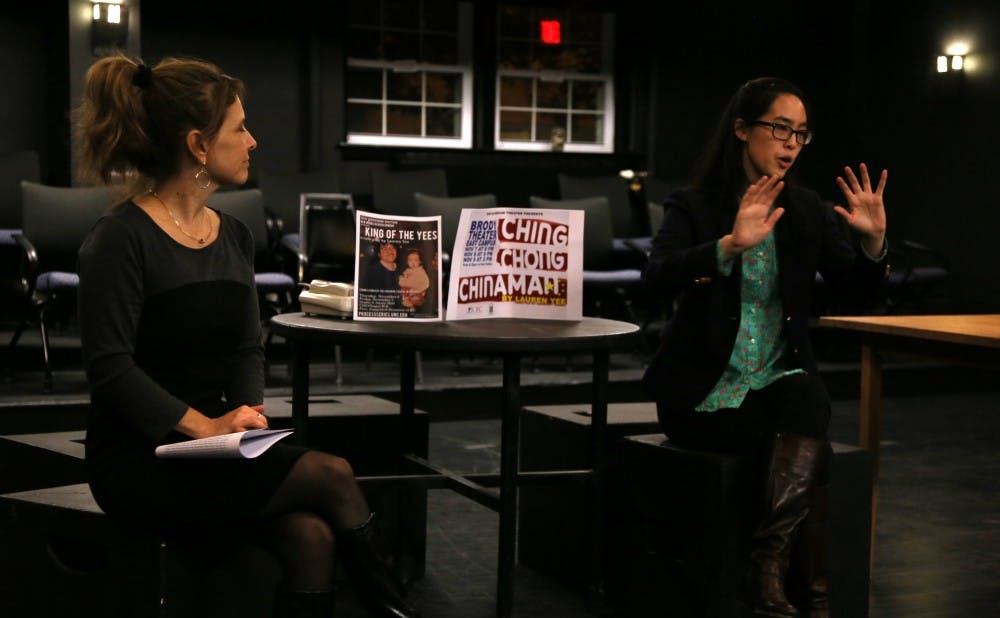In Young Jean Lee’s play Songs of the Dragons Rising to Heaven, several of the characters deliver a torrential speech in unison critiquing “unfashionably angry minorities” but continuing: “The truth is, if you’re a minority and you do super-racist stuff against yourself, then the white people are like, 'Oh, you’re a "cool" minority,' and they treat you like one of them.”
To this day, those lines have stuck with me as a particularly vitriolic expression of an internal dilemma, the often paradoxical relationship between critiquing and including those who are being critiqued. The challenge for ethnically charged and socially conscious theater is how to play the identity politics game without broadly alienating its audiences yet still remaining true to one’s original message. How does one build ethnic identity without becoming exclusionary? How does one empower one group but not at the expense of another?
Enter Lauren Yee.
The young playwright, now based in New York, began writing her first play Ching Chong Chinaman as her senior thesis at Yale University in 2006. Fast forward eight years, and the play has been performed all over the world. This Friday, Duke Asian American Theater will bring the play to Duke. Ching Chong Chinaman will be the group’s first full production since its inception.
Ching Chong Chinaman is a fantastical kind of play, set in a dream space but conversely occupied by prosaic and sometimes very mundane characters. There is the undeniable presence of critique: Jin Qiang, or "Ching Chong," is a Chinese immigrant drawn to America by his dream of becoming a dancer. He is able to come to America, but only because he is hired as a full-time servant for a whitewashed Asian American family who, despite their outward similarity to Jin Qiang, share none of his cultural background.
In a Monday evening conversation with DAAT and other audience members, Yee explained that the inspiration for the play came from a temporary obsession with World of Warcraft, which her brother had introduced her to. She quickly found out that gamers would sometimes employ gamers in other poorer countries where wages were much lower to play particularly tedious or difficult portions of the game for them. This practice of “gold farming” quickly caught her attention. “What if someone actually brought that person here? That was the seed,” Yee explained, for Ching Chong Chinaman.
Kathy Zhu, the president of DAAT and an actor in the production, explained that the play’s nuanced engagement with sensitive material "addresses and deconstructs many stereotypes about Asians and Asian Americans (especially Chinese/Chinese Americans) in a clever, interesting way.”
Such deconstruction begins with the name of the production itself. Ching Chong Chinaman–normally a racist slur–forces the audience to consider the social construction of identity and prejudice.
“Through the play, we can pose questions about who has the right to define identity, belonging and agency—and who, if anyone, has the right to use these pejorative, racial terms,” Claire Conceison, a professor of Theater Studies at Duke and DAAT advisor, said. “In some ways the play asks us not to take ourselves too seriously, but in other ways it demands that we do.”
The disjuncture between people who look the same but act very differently created an interesting foil from which Yee eventually wrote a play which explores constructed social identities, stereotypes and self-perception. Jin Qiang and the Asian American family who adopts him look the same but are nothing alike, and their hopes and expectations clash and dovetail simultaneously in tragic but often comedic ways.
Using this foil, Yee cleverly sidesteps the conundrum of writing a socially aware play revolving around issues of ethnicity without falling into the “angry minority” trope. She utilizes yet also critiques the concept of a “banana” Asian, a person who looks “yellow,” or Asian, at skin level but is truly “white” inside through the characters of her Asian American family. In doing so, Yee reclaims these pejorative terms by using them as means for questioning other similar stereotypes and slurs. It’s an adroit way of criticizing without excluding or alienating the average audience member.
Along the way, people can have fun too. Production director and DAAT vice-president Harmony Zhang expressed her wishes for the upcoming performances: “I hope that everyone who comes to Ching Chong Chinaman will receive an entertaining night of theater that brings to light important topics in a new, enjoyable and fun way.”
Ching Chong Chinaman will be performed Nov. 7 through Nov. 9 at Brody Theater on East Campus. The event is free and open to the public.
Get The Chronicle straight to your inbox
Signup for our weekly newsletter. Cancel at any time.

